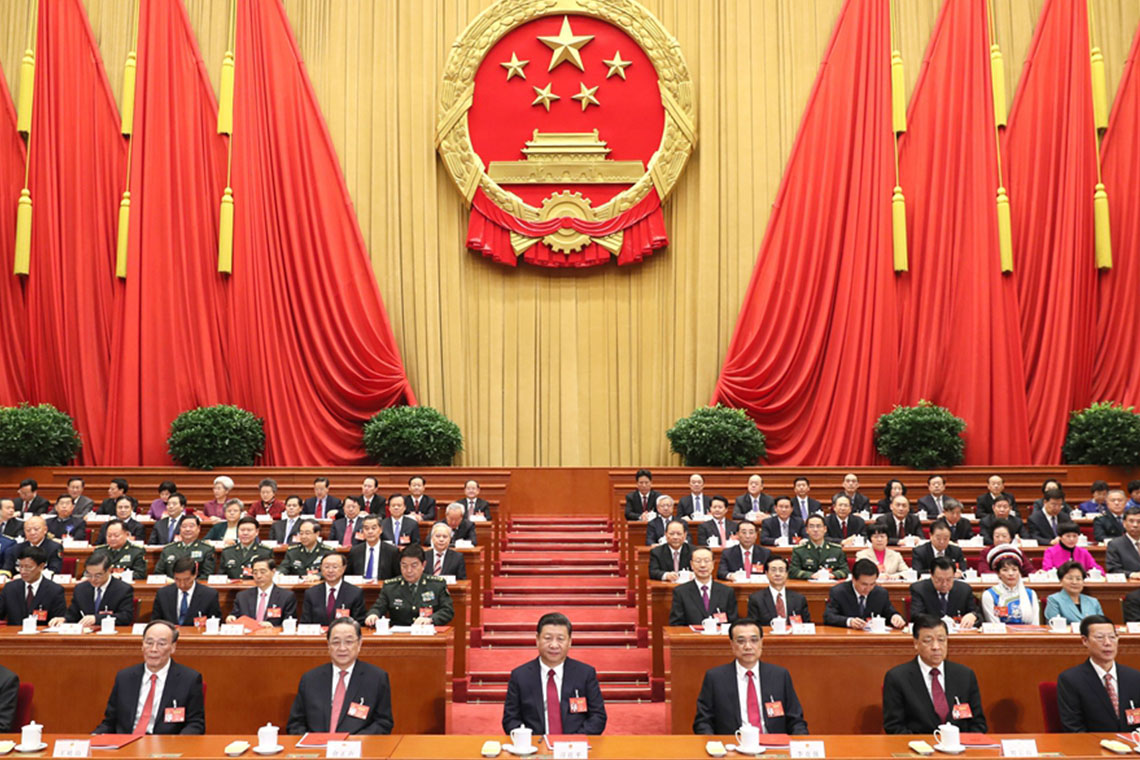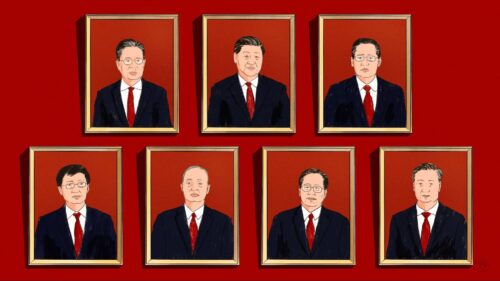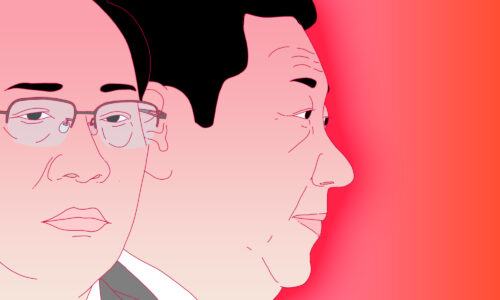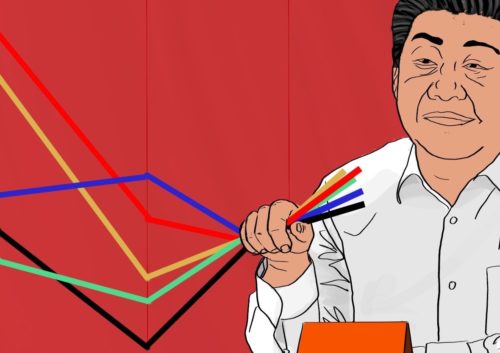The case of the missing Politburo member
Top China news for March 15, 2017. Get this daily digest delivered to your inbox by signing up at supchina.com/subscribe.

Where in the world is Zhang Dejiang?
The Two Sessions — China’s annual series of political meetings held in Beijing in March — ended today with a press conference given by Premier Li Keqiang and a closing ceremony of the National People’s Congress. The most surprising item of the day is the photo (see above) that accompanies Xinhua News Agency’s top story (in Chinese) about the closing ceremony — it shows six of seven Politburo Standing Committee members but excludes Zhang Dejiang 张德江. Zhang chaired the meeting and is mentioned in the text, but photos are often used as signals in Chinese politics, and one has to wonder whether this photo is an editorial mistake or an indication of some kind. In last year’s Xinhua report on the same event, there is a similar photo of the Politburo Standing Committee, but there is a huge photo of Zhang Dejiang right beneath it. Zhang is 71 and due to retire at the Communist Party Congress scheduled for this fall, so perhaps the photo means nothing, but it is curious nonetheless.
One other point of interest from the last day of the Two Sessions, as noted in a tweet by India Today’s China correspondent Ananth Krishnan: At Li Keqiang’s press conference, he mentioned a serious jobs challenge facing the country this year, as 7.95 million university graduates will enter the labor market as well as 5 million secondary and vocational school graduates, and hundreds of thousands of workers have been or will be laid off as part of efforts to cut overcapacity.
There are several roundups of this year’s Two Sessions worth reading, if the subject does not bore you to tears: “Nothing to see but comfort for Xi at China’s annual parliament” at Reuters, “China’s premier, Li Keqiang, strikes upbeat tone amid U.S. tensions” at The New York Times (paywall), and “The many things China doesn’t want: Highlights from Li Keqiang’s press conference” at the South China Morning Post. Finally, Bloomberg has a review of “China’s next class of leaders” who stood out in one way or another at the Two Sessions, and The New York Times takes a close look (paywall) at the draft civil code that was one of the most discussed topics to come out of the meetings.
If you are new to the Two Sessions, today, we publish a short primer on the event by yours truly.
Women and China: A The China Project-sponsored forum
We’re organizing a conference on May 18 in New York with female speakers who are movers and shakers in technology, business, and journalism in China. Please click here to book tickets.
Going blind in a Chinese hospital
Chris Gill is an painter whose formative years were spent living and working in Beijing at the Yuanmingyuan Artists Village in the early 1990s. He lived in China for more than 20 years, working as an artist and journalist, including a stint heading the Shanghai bureau of the Russian news agency Interfax. In 2011, he started going blind, an effect of the autoimmune disease multiple sclerosis. Chris has self-published a book about his time in China, his art, and the travails of getting treatment for a much-misunderstood disease in Chinese hospitals. The book has many typos, as Chris dictated it to a computer using software for the blind, but it’s a humorous and riveting read. You can buy it on the Kindle store: Lost Son of the British Empire.
Beijing rooftop stunts and sperm whales
That’s Beijing has published a photo gallery and story about the capital’s “rooftoppers” — people who climb to the top of skyscrapers and cranes and photograph themselves in hair-raising poses. On a sadder note, Xinhua has a series of photos of a dead sperm whale that was trapped in fishing nets off the coast of Huizhou in Guangdong Province.
—Jeremy Goldkorn, Editor in Chief
Today on The China Project
Sino-Japanese relations are often in the news for acrimony, but here’s a happier tale by George Koo of how Japan benefited from friendly ties with China. Meanwhile, today is the last day of China’s Two Sessions. To celebrate, we publish a brief explainer, which notes highlights from this year’s meetings.
This issue of the The China Project newsletter was produced by Sky Canaves, Lucas Niewenhuis, Jia Guo, and Jiayun Feng. More China stories worth your time are curated below, with the most important ones at the top of each section.
BUSINESS AND TECHNOLOGY:
- China’s name-and-shame TV show puts household brands on edge / Bloomberg
Today is World Consumer Rights Day, an annual promotion of the rights of consumers, which was launched on March 15, 1962, by U.S. president John F. Kennedy. There’s not much fuss made about it in America, but it is a big deal in China, as many large companies are targeted for unfair practices by the country’s state broadcaster in an annual program called “CCTV March 15 Gala” (晚会 3.15). This year, highlighted companies included: Hudong Baike, a Wikipedia-like online encyclopedia, for becoming the largest “false advertising garbage station”; Muji stores, for selling nuclear-contaminated food from Japan; Nike, for selling basketball shoes with solid rubber bottoms instead of advertised air cushioning; ecommerce sites JD.com and Alibaba’s Tmall, for selling contaminated food and water on their platforms; and Wuhan Le Bailing Biological Technology Company, for inviting fake doctors to give “health lectures” to elderly people and selling dodgy health products.
On the popular Chinese social network Weibo, many users praised the TV program. One commentator said, “Calbee food was actually nuclear contaminated. I threw out the rest right away. But I already ate two bags and am worried that I probably have genetic mutations.” Another commentator said, “It is obvious that ‘3.15’ was focusing on issues that mattered to people’s health and life such as food safety, instead of matters such as car repair or a mobile phone quality problem.” (All links above in Chinese.) - China’s Anbang denies report of Kushner property investment / Reuters
China’s Anbang Insurance Group denied earlier reports indicating that the company was investing $400 million in a Manhattan office tower owned by the family of Jared Kushner, President Donald Trump’s son-in-law and senior adviser. A spokesman for Anbang said that “there is no investment from Anbang for this deal.” Kushner Companies, which bought the property located at 666 Fifth Avenue for $1.8 billion in 2006, responded that “nothing has been finalized.” The New York Times reported (paywall) in January that Anbang chairman Wu Xiaohui and Jared Kushner were nearing agreement on a joint venture to redevelop the building.
- How to impress China’s mass affluent males – a report on how to influence wealthy male Chinese consumers / Jing Daily
- China’s top chipmaker downplays rivalry with U.S. / Nikkei Asian Review
- Acupuncture and amusement parks: China rolls out service-economy gauge / WSJ (paywall)
- Marks and Spencer pulls out of China’s High Street — the world’s biggest retail market / The Telegraph
- Beijing to strengthen regulation of online catering / China Daily
POLITICS AND CURRENT AFFAIRS:
- China begins new work on disputed South China Sea island / Reuters
New satellite images appear to show that China has started new construction work on islands in the Paracel archipelago (西沙群岛 xishā qúndǎo), which are also claimed by Vietnam. The work includes “land clearing and possible preparation for a harbor to support what experts believe may be eventual military installations.” Meanwhile, Xinhua reports that Chinese defense minister Chang Wanquan 常万全 met today with Pham Hoai Nam, commander of the Vietnam People’s Navy, “with the two sides vowing development of military-to-military relations.”
- China’s Xinjiang offers leniency for ‘terrorists’ who turn themselves in / Reuters
- How serious is the Islamic State threat to China? / The Diplomat
- Tillerson to press China on North Korea in tough first Asia trip / Reuters
- China could prevent 3 million deaths a year if air quality standards tightened, study suggests / SCMP
SOCIETY AND CULTURE:
- China’s first successful homegrown boy band is incredibly wholesome / Quartz
The Fighting Boys (aka TFBOYS) is China’s most popular homegrown boy band. One measure of its success is that a note in 2014 by member Wang Junkai 王俊凯 holds the Guinness World Record for the most number of reposts on the social media platform Weibo, where he thanked his fans for supporting him on the occasion of his 15th birthday. As of today, his post (in Chinese) now has more than 213 million reposts. The band’s members are squeaky clean and sing about doing their homework, being the future of communism, and patriotism. The Quartz article linked above includes a video to give you a taste of their saccharine songs.
- Unexpected? Lhasa is China’s happiest city of the year (again) / What’s on Weibo
- An educated man is not a pot / China Heritage
- Meet China’s oldest photographer, 105 years old and still snapping / Shanghaiist
- Chinese-Korean co-production halted over THAAD fallout / China Film Insider





